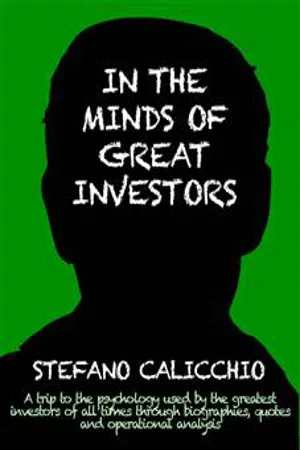We have come to the conclusion of our journey of study and discovery into the psychology of the greatest investors of all time. During the reading, we have studied in depth what differentiates exceptional people in terms of results and financial successes achieved from the large mass of improvised investors.
I hope that this book could have been a fun reading for you and at the same time an opportunity for inspiration and a stimulus for improvement, just as the research and study activity that brought me all the way here has been for me.
Being able to learn about the history and thought of characters like Warren Buffet, Peter Lynch, William Gann, Carl Ichan and many others was not only an opportunity for me to open my mind and explore new horizons, but also a starting point to approach life in a different way. I believe that in the same way this quick and immediate manual can be a useful starting point to study and deepen the best thinking strategies to apply in business and personal investment.
Among the things that I have had the opportunity to appreciate more, there is one element that I believe should be highlighted: the great ability possessed by all these individuals to keep their focus on what can be done to constantly improve their results.
The other point I would like to highlight is the great psychological security that characterizes the lives of all these characters. Having a method and deciding to apply it even in the worst or most discouraging moments, is what has made the difference between the anonymous investors who populate the market and those who have been able to constantly produce results beyond expectations.
It only remains for me to thank you for having finished reading this guide, hoping to find you as readers in one of my next works. My wish for you is to be able to put what you have just read into practice in the best possible way, in order to find your personal key to success in the world of investment and business.
Auto Test – Evaluative
This book ends with an invitation to action! The following questionnaire is designed to help the reader consolidate the theoretical and practical notions that have just been presented, through an exercise that is both playful and formative at the same time.
Being able to understand in depth the psychology of large investors can be quite difficult at first reading.
The test is designed to return to some of the most important steps of this guide, in order to strengthen the fundamental concepts. Below you will find a series of multiple-choice questions. At the end you will be able to read the keys to solving the questions.
1 - According to Benjamin Graham's smart investor theory?
a) The value of an investment is necessarily identical to its market price.
b) The value of an investment is not necessarily identical to its market price.
(c) The value of an investment depends on the management's management capacity.
(d) The value of an investment can be easily determined using the best technical analysis tools.
2 - Following the Great Depression of 1929 John Templeton decided to:
a) Buy 100 shares of each stock listed on the NYSE for less than a dollar.
b) Buy 100 shares of each stock listed on the NYSE for less than $100.
c) Sell all the securities in his possession to try to buy them back at a lower price.
d) None of them.
3 - On what principle does Warren Buffett recommend that you plan your investments?
a) On the study of new markets that may develop in the future.
b) On companies that can guarantee massive profits in the near future.
c) On the fact that profits are made when you buy, not when you sell.
(d) To keep an open mind towards every available option.
4 - What motto made Peter Lynch famous?
a) Study your competitors.
b) Invest in what you know.
c) Anticipate the market.
d) Always consider the margin of error.
5 - What does David Dreman suggest about the currency of a financial asset?
a) People can pay up to 100 times what a share is worth.
b) During crises and depressions it is possible to do the best business.
c) Markets follow precise cycles, understanding the causes can anticipate the consequences.
d) None of these.
6 - What instrument is at the basis of W.B. Gross's main investment strategies?
a) Bonds.
b) Shares.
c) Commodities.
d) Derivatives.
7 - According to William Gann, every market movement is the result of:
a) A mechanism of adaptation between supply and demand;
b) pure irrationality;
c) a clash between intelligent and improvised investors;
d) a natural law and a cause that exists before the effect takes place.
8 - What do you see as a discriminating factor in a potential Carl Ichan investment?
a) quarterly;
b) the business;
c) dividends;
d) management.
9 - According to Philip Fisher, what is the best time to sell an investment?
a) Never.
b) After a year.
c) When the target price...
